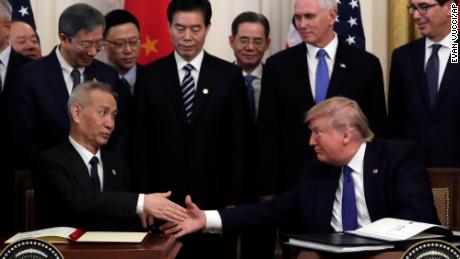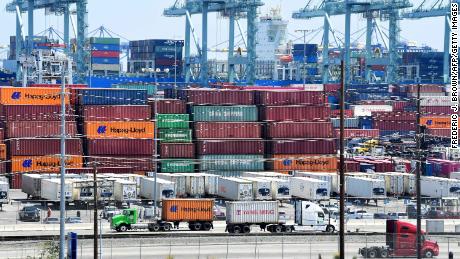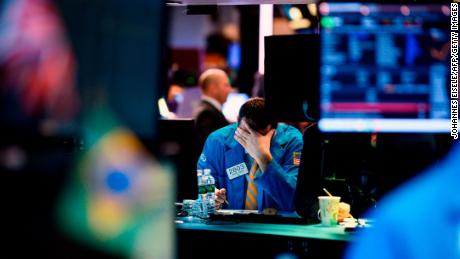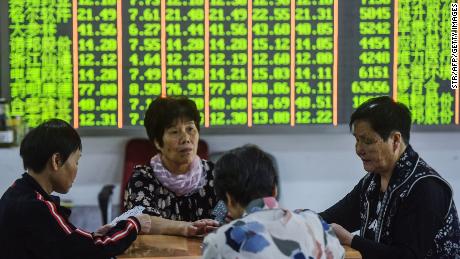Hong Kong (CNN Business)President Donald Trump's latest threat to increase tariffs on Chinese goods risks reigniting a trade war between the world's two biggest economies.
The threat to raise taxes on virtually all of China's exports to the United States ŌĆö made in a tweet on Sunday ŌĆö comes days before the two sides are scheduled to meet for a new round of trade talks in Washington. US Trade Representative Robert Lighthizer confirmed Monday that the administration plans to increase tariffs on $200 billion of Chinese goods, starting Friday.
Yet trade negotiations are moving forward. The Chinese government has confirmed that its top negotiator, Liu He, will still attend talks in Washington on Thursday.
Tenuous trade truce
Trump has repeatedly slammed China for indulging in what he says are unfair trade practices, particularly with regards to access to its giant market, intellectual property and technology transfers. He has said that a big trade deficit with China shows the United States is being ripped off.
The talks are aimed at settling a dispute that has hurt Chinese exporters, damaged parts of the US economy, and slowed global growth since it began last July.
The United States fired the first big salvo back then, imposing 25% tariffs on $50 billion worth of Chinese exports from the aerospace, robotics and auto industries. China retaliated with its own tariffs on American goods worth $50 billion, including agricultural products and chemicals.
Around two months later, Trump hit Beijing with another set of tariffs, announcing a 10% duty on goods worth $200 billion. Beijing responded at the time with tariffs ranging from 5% to 10% on $60 billion worth of US exports.
Trump and Xi announced a truce in early December, agreeing not to further escalate tariffs. Trump delayed a plan to raise the existing tariffs from 10% to 25%.
Investors are nervous
The two sides have held several rounds of talks since then. But Trump's sudden threat has ratcheted up tensions again, and investors are worrying about what an all-out trade war would mean for businesses and the global economy.
Global stock markets reacted strongly on Monday, signaling that investors could be in for a tumultuous week. The pain was worst in China, where the Shanghai Composite shed 5.6%.
Fears appeared to be waning on Tuesday, as it became clear that the two sides are still talking. The Shanghai Composite and Hong Kong's Hang Seng both posted gains, while losses on major European indexes were limited to less than 1%.
US stocks futures were down roughly 0.5%.
Investors had been expecting a timely resolution of the dispute between Beijing and Washington. That assumption was a key driver of the 2019 US stock rally.
Global growth at risk
It's not clear whether Trump's threat indicates a tougher US position in the talks or is simply a negotiating tactic. Lighthizer and US Treasury Secretary Steven Mnuchin on Monday accused Beijing of reneging on agreements already reached.
China's foreign ministry said Tuesday that "negotiating is a process of discussions," and that it's "natural for the two sides to have disagreements."
"China won't avoid the problems, and we are sincere in continuing the negotiations," spokesperson Geng Shuang told reporters in Beijing.
Analysts say an escalation could hit growth both economies and drag down global growth.
"Escalation of the trade war could be the trigger for weaker global growth," said Tai Hui, chief market strategist for Asia at JP Morgan Asset Management. "We continue to be constructive on the US economy, but external shocks could derail such optimism."
If Trump carries out his wider threat to impose a 25% tariff on nearly all of China's exports to the United States, that could knock 0.3% off China's gross domestic product, according to Julian Evans-Pritchard, senior China economist at Capital Economics.
"There will be a direct hit to Chinese growth," he said, adding Beijing would likely respond with new measures to stimulate the economy.
Business warns
The US business community supports Trump's efforts to rein in intellectual property theft and open up China's market. But companies generally oppose tariffs, which they say raise costs and hurt demand.
Global automakers, which also face separate US tariffs on steel and aluminum, have been hit hard.
Carmakers such as Volkswagen (VLKAF), General Motors (GM) and BMW (BMWYY) have come to depend on China for a huge chunk of sales, and they've been hurt by tariffs and an economic slowdown in China.
BMW hiked prices of two popular SUVs it sells in China, its largest market, last year after Beijing retaliated against US tariffs with taxes on vehicles made in the United States. BMW has a huge plant in South Carolina.
The German carmaker issued a profit warning in September 2018, placing some of the blame on " international trade conflicts." It issued another warning in March that cited trade policies as a risk.
The company said on an earnings call Tuesday that it continues to monitor the "volatile" trade situation. "We are, of course, in favor of free trade," CEO Harald Kr├╝ger told reporters.
Harley-Davidson (HOG) has said that tariffs in the United States, China and Europe will cost the company up to $120 million this year. The company is ramping up production in Thailand to help lower costs.
Retailers and producers of agricultural products have also been caught in the middle. The Trump administration has stepped in with billions of dollars in aid to US farmers.
"A sudden tariff increase with less than a week's notice would severely disrupt US businesses, especially small companies that have limited resources," the National Retail Federation said in a statement Sunday.
Warren Buffett, the chief executive of Berkshire Hathaway (BRKA), said Monday that a trade war is "bad for the whole world."
"You can't do something between the United States and China in a big way without it affecting all the major markets," he said during an interview with CNBC.






















